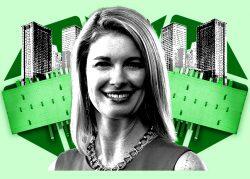UPDATED March 10, 2022, 6:00 p.m.: Cathy Bier, the top broker serving the La Grange area in Chicago’s western suburbs, is moving to Coldwell Banker with her three-person team from Compass.
“The network that Coldwell Banker provides and the reach they have not only nationally but internationally was attractive to me,” Bier said in an interview.
Capturing clients from overseas and across the country is more important than ever, she says, as today’s pool of buyers is less concentrated among those leaving Chicago to settle in the suburbs as it became wider than ever during the pandemic.
After Bier’s team set its new record in 2021 with $76 million in sales of 146 properties, she isn’t seeing any slowdown in demand. Offers, sometimes dozens, are stacking up for homes within a day, and sometimes hours, of listing, and she hopes to grow this year by being more prepared than ever to relocate people to the Chicago suburbs
Read on for Bier’s take on the duration of the seller’s market, the impacts of remote work policies and the reasons she switched to Coldwell from Compass.
This interview has been condensed and edited for clarity.
Is which brokerage you work with more important than ever since buyers in Chicago’s suburbs are relocating from outside Illinois more often than before the pandemic?
Over the last several weeks, I’ve relocated two people from LA into the Midwest. I think people are moving. With hybrid work schedules, people are no longer tied to being 15, 20 or 30 minutes from the office. What that’s done for residential real estate is it’s moved quicker, faster and opened up this enormous geographic area for so many people to live wherever they want to live. I think that’s independent of the brokerages. I think that’s just the natural movement in the market. How do we capture that? We capture it with the brokerages. But the reality is the internet has catapulted residential real estate to move so much more quickly than it ever has in the past. I’ve gotten inquiries from people in London, people in Singapore who are expatriates working over there and are moving back to Chicago and looking on the internet for properties in the western suburbs. The world has become so much smaller and the information has become so widespread.
You were affiliated with Joan Smothers’ team for 19 years until Smothers merged with Compass two years ago. Did you notice benefits of working for a larger brokerage when the Smothers’ team joined Compass and what do you expect to be different about working with Coldwell?
Compass is growing, and is moving very quickly. Coldwell Banker is very established. It was founded in 1906. It’s a very established network of agents throughout not just the United States. We don’t have a ton of international business, but I have a client right now leaving the western suburbs of La Grange and moving to Denmark. So that movement is happening. I think that was definitely taken into consideration in coming to Coldwell Banker because those resources and tools are here as well.
Is the hot streak for home prices in the suburbs ever going to slow down?
We all wish we had that crystal ball. But what I do know is, with everything happening around the world [like Russia’s war on Ukraine], historically speaking, some of the activity would shut down residential real estate, because we mirror what happens in the markets. The difference in 2022 is that we have several factors that are playing in buyers’ minds. We have a rising interest rate environment, inflationary factors and I’m still hearing a sense of wanting more space and the quietness of the suburbs. In my particular niche market, we are where people land when people come out from the city. That continues. The biggest thing is the dynamics of supply and demand that ends up happening in an extremely low inventory, high demand market. What would normally put a little bit of a pause on residential real estate, I have not seen it. I put up five listings on Wednesday night, four of five are gone and I’m negotiating the fifth. Every single one had multiple offers, from up to 26 on a single house to six.
Do you worry about more distant suburbs than Chicago’s near west gaining steam with workers less tied to living nearby offices?
I really don’t think so. Nobody really knows what the future holds. Even though people may not be working in what historically was our normal office environment, we still want to go back to the city for all the things we love about Chicago, whether it’s entertainment, the beaches or restaurants or whatever people are drawn to the city for. We are a soft landing for people who have grown accustomed to easy city living.
Read more


